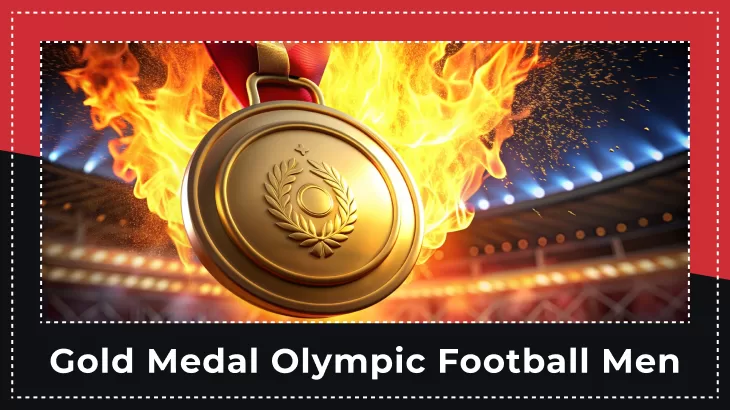The Ultimate Guide to Olympic Football: Winners, Legends, and Historic Moments

The Olympics have somewhat of a storied past with football, having featured some big names and gripping entertainment in their time. Over the years, as it has developed, fierce battles for Olympic gold from national teams also take place. Whereas Olympic football now offers the perfect platform for rising stars and grizzled veterans alike with men’s and women’s tournaments both squeezed into an ever-growing schedule. Here we look back at the history of Olympic football, with all previous winners listed alongside some top achievements and what those who have won this event later accomplished. The most notable among them are the Olympic football winners, and each of their journeys tells a story about how football has changed as well as who is currently at the top when it comes to playing this beloved sport based game on PS4.
Introduction
Football was first included in the Olympic Games as a men’s competition in 1900, allowing nations to stake their claims on an international footballing level. The Olympic football tournament is home to a variety of unforgettable moments, iconic players and class encounters over the decades. With the women’s tournament added to Olympic football in 1996, while it has taken decades for women national teams to achieve parity and growth at those international level events, in terms of heightening the achievements on behalf of their own nation with respect as well.
Olympics: Football and its Legacy.

The sport of football was included during the early 20th century in an Olympic Games and since then, has continued to be practiced as one of its parade events. 1996 was when the women’s football tournament joined, but it has been keeping track only since 1900 for men. Through the years, the format and rules have changed but it has stayed true to its roots of bringing out the best football talents all around the world. As so many countries treat the Olympic tournament as an amazing showcase for their national teams in competition to win what is, let’s face it, a major honor – that of earning an Olympic gold medal. The addition of the women’s tournament was a landmark moment and indicated both FIFA’s growing commitment to strengthening its engagement with female footballers worldwide.
A Brief History of Olympic Football at the Games
The formative years of Olympic football saw Europe as the powerhouse continent in its tournaments, with Great Britain winning the gold medal at both 1900 and then again in their succeeding efforts at 1908 and 1912. The early international competition for player and national pride continued to be a significant British link as well as the Olympics, especially because it was still somewhat of informal celebration. South American teams made their presence felt in the 1920s and 1930, with Uruguay winning gold medals two Olympics in a row first place each of the athlete moves year: Italy won it. These nations were a testament to the growing worldwide stature of football and that quality was not just confined within Europe.
Later, after the second world war ended and new footballing powers emerged like Hungary or Soviet Union, which was shining even in team sports for that golden age of soviet sport), also Yugoslavia could play). The 1950s and ’60s saw Hungary dominate the water polo events, claiming gold in London in 1908; Helsinki eight years later albeit with a second-string team following their blood-stained meeting with Russia as well three further triumphs (in Melbourne/Sydney), Rome/Florence/Perugia most recently Tokyo against host nation Japan, to underline its tactical acumen and technical grandiosity. Successes also came in 1956 (Soviet Union) and 1988, underlining the dominance of Eastern Europe during this partident period.
The 1990s and early 21st century has seen significant divergences in the Olympic football tournament structure from other international competitions, with professionals permitted but few announcements indicating plans to include female players like many traditional men harshly criticizing any such plan. This, coupled with changes such as the growth of African and Asian teams expanded horizons within competition. Nigeria’s breakthrough in 1996 and Cameroon’s victory three years later showed the tournament was now a global affair, symbolizing football expanding to every region of the globe.
The women’s tournament was introduced in 1996 and has been a platform for female athletes to compete at the highest level. The United States was dominant with gold medals in 1996, 2004, two more and Norway won it in 2000 followed by Germany’s win four years ago demonstrating the strength of women playing soccer in different parts of the world. What Canada achieved in 2020 was but a sign of the improvement and spread of women’s football across the world, making it hard to predict with confidence whether they will become one of Europe or Latin America. From there on, again?
Gold Medal Olympic Football Men – Men’s Gold Medalists (All-Time)

The men’s Olympic football tournament has a mixture of sides representing various continents and there have been differing winners over the years. British supremacy prevailed in the formative years, claiming gold titles at Paris 1900 before following up with another triumph on home soil at London 1908 prior to a third success soon after during Stockholm 1912. Uruguay won the first two titles in 1924 and 1928 as they presented themselves to be one of football’s earliest powerhouses. Italy didn’t win gold until 1936 and then in 1948 it was the turn of Sweden. The 1950s and the 1960s have been a significant time for Hungary and West Germany with gold medals during three Olympics up until that point, Owning all of its medals from team foil. In addition, the Soviet Union claimed gold in 1956 and again for a final time in 1988. There have been a mixture of winners in the last few decades, Nigeria tasted glory for calling time on their Olympic boogie in 1996, whilst Cameroon won it two years later and Argentina claimed back-to-back successes with triumphs either side of Y2K. Before 2016 and under the guise of a football powerhouse, Brazil remained second-best till yesterday when they clinched their first gold medal which they had only defended in 2020 while as for Argentina it was an out-of-competition Gold.
Various regions from different parts of the world have distinct footballing traditions and this is why a diverse set of winners in the men’s Olympic football tournament are not unusual for the sport. The World’s Most Dominant Olympic Football Teams and the Best Players of All Time from Each Era The triumphs of Great Britain in 1900, 1908 and as the stage was set for European supremacy in the early years by their victories in 1912. South American football particularly demonstrated their skill and touch in Uruguay’s victories at the 1924 and 1928 tournaments to show that Uruguay was a significant power of world association football.
Proven in 1936 with a win under the highly politicized arena of pre-war Europe, it showed how tactically adept the Italian team were. Post-war years were adorned by Sweden’s victory in 1948, which was a natural consequence of their rich football tradition. Hungary’s great side of the 1950s and ’60s, although they have won gold before too, competed in Mexico with some extraordinary players – none more so than Ferenc Puskás, one of the game´s first playmakers. The Soviet Union set the standard for a disciplined and tight backline in their gold medals wins of 1956 (then part of Russia) and 1988.
The Olympic football event next saw a new champion in the 1990s and 2000s. Nigeria’s 1996 triumph was a landmark moment for African football, as the country became the first to win Olympic gold in football. It was a victory that heralded the arrival of African football as an upcoming force, thanks to this team which included future stars Nwankwo Kanu and Jay-Jay Okocha. Cameroon reinforced Africa’s top-tier status in world football with victory in 2000, thanks to the likes of Samuel Eto’o and Patrick Mboma.
Argentina’s victories in 2004 and again, with Messi among the future immortals that tore up Unay Road back then — underscored how even further South American supremacy stretched. The most memorable scene, however, came in 2016 when Brazil won its first Olympic gold medal by emerging the victor in an epic penalty shootout with Germany. For a nation steeped in football history, the prospect of securing Olympic gold had come to symbolize something more for Brazil and Neymar’s decisive penalty kick delivered just that. In 2020, Brazil again confirmed its affirmation in the field of football by retaining their title after defeating Spain.
Top 10 Teams with Most Males’ Olympic Football Gold Medals

Hungary and Great Britain have been the few successful teams in Olympic men’s football, with 3 gold medals each. In the middle of the 20th century, Hungarian swimmers continued to dominate in pool swimming and Great Britain began to lead the world in women’s competition. Brazil has a storied history in football, and their recent victories only make that more apparent. This and the Soviet Union’s unpretentious gatecrashing filled numerous awards. And in the process of securing gold, these national teams have also left an indelible mark on their sport.
The success of Hungary in the 1950s and ’60, winning gold on three occasions (36-52-56) was a tribute to their own freedom – free flowing soccer played with tactical intuition. Known as ‘The Magical Magyars’, they transformed the landscape of football with their fluid playing styles and technique. Those first three in 1900, 08 and 12 highlighted Great Britain’s monopoly of the Olympic football tournament in its fledgling years. These were milestones instrumental in the sport’s evolution, as well as an indication of great things to come.
Their gold medals in 2016 and in 2020 confirm just how widespread Brazilian football can be. Brazil had always been the bridesmaid at the Olympics, having failed to clinch gold even once before their heroics in 2016. This was an achievement of huge significance and one that finally delivered the nation’s collective dream — but also itself became just another trophy in Brazil’s storied footballing history. 1966 and 1988 were gold-medal winning years for countries like the Soviet Union, who played with tactical discipline domestically (largely) that made their international sides among the best in desperate times.
It has been the success of these national teams that have earned gold medals in their respective categories at Olympics, which no cricket board can ignore. Their triumphs have inspired generations of footballers thereafter, and helped raise the bar in terms of what is to be felt as international success. The success of these teams’ branches out further than just championships, as this success has affected the growth and change in football.
Men’s Top Results and Statistics.
- Ferenc Bene of Hungary is the youngest gold medalist in men’s Olympic football after winning for a second time, aged just 18 (1964). This outstanding record is a testament to how much youth plays are used in football, it shows the possibility of young players doing wonders for their country. The most goals in the final, 2-0 after Hungary beat Yugoslavia in 1952. The game displayed Hungary’s total football style of play, which they had very much perfected through the mid 1950s.
- Tellingly, Nigeria emerged victorious in 1996 — the first time an African nation had ever won gold at this level of football. Arguably, the biggest win was a major step forward for African football and served as a blueprint of the continent’s capabilities at that level. This ‘era’ underlines the Soviet Union’s proud history in football, and they also won (briefly) in 1956 (although between these 2 finals- USSR were at war with most of themselves…. as another interesting fact about that victory was it followed a play-off to make it there due to realignment from Korea). This period also marked the emergence of a more disciplined Soviet Union, who regularly competed at all levels from youth to senior rank and with strengths in technique that allowed them to easily outclass most opponents.
- Brazil faced Germany in the Olympics football gold medal clash but Gabigol’s late strike was enough for his country to get a victory via penalty shootout. This game was huge for Brazil, their opening World Cup match being staged in the Maracana and providing a moment of national pride against fanatical rivals. When Neymar sent home the winning penalty for Brazil’s first Olympic gold in football, it satisfied a nation that had long waited to feel great. The tournament has been great and the 2016 final was a perfect ending to it.
Here are the records and notable facts in men’s Olympic football which bring to life what a glory tournament the event is. Over the years, Olympic football competitions have displayed both accomplished European teams and emerging nations from South America, Africa or Asia. The tournament has showcased young talent rising through the ranks and proud footballing nations showcasing their quality in a global stadium.
Winners of the Olympic Football Women – List of Women’s Gold Medalists

A handful of key nations have been dominant in the women’s Olympic football tournament. Aside from a gold-medal showing by the United States in 1996, every FIBA Women’s Basketball World Cup has been won by an Eastern European country. A win in 2000 ended the US stranglehold for Norway in the path for gold, silver and bronze medals. Germany also won gold in 2016 and Canada claimed their first-ever title in the event back in 2020. This gold medal match was pure extreme football – olympic champions always in a good shape for the finals.
The year 1996 brought us the women’s Olympic football tournament, something which is regarded as one of those “don’t miss” events at all subsequent editions of the Games where you can win most Olympic medals. This level of the women’s game, where the U.S. reigned in those early years of WWC takeaways — it was a high bar while simultaneously signifying second-class citizenship for an entire universe at once hedging and explaining itself as “the half.” Their triumphs in 1996, 2004, 2008 and – controversially so – even their win of the relay at London Games four years ago underscored a blend of game-planning strategy, running pace execution and ethos in competition. Norway’s victory in 2000 was also a notable moment as it put an end to the US dominance of top honors and highlighted that women footballers from outside North America could be strong too.
After Germany’s success in 2016, Korea DPR celebrated the following year as north Asia became the fourth continent to claim an Olympic gold before Europe restored order through Spain(1992), Norway and Portugal (both ’96) then Sweden. The 2020 victory of Canada was a landmark win for the young footballing nation, with their ability to grow and develop in full force. They won every match in straight sets on their way to a first Olympic gold but the journey was not totally smooth, highlighting the growing standard of play by teams across this women’s competition.
In the women’s Olympic football tournament, champions have emerged from South America to Asia and points in between showcasing both how far the game has spread as well as a growing list of potential challengers. Those gold medalists who have gone before and won across the decades, that golden quilt of Olympic football history which has been woven with whatever particular style they brought.
Top 10 teams for the women’s Olympic Football Tournament
At the top of women’s Olympic football is a tie between four countries, but gold medals at both Athens 2004 and London 2012 means that only one team represents an entire continent. It is their sustained excellence across consecutive tournaments that has set them apart as the benchmark in women’s football. Other countries such as Norway and Germany have also won a gold medal in the history of football. The recent success for Canada in 2020 highlights a strengthening of the competition overall in women’s football and therefore an even greater number of countries who are genuine contenders to secure gold.
The United States painstakingly groomed women’s Olympians through their comprehensive youth programs, knowledgeable coaches and a deep reservoir of talent. Considering what female superstars such as Mia Hamm, Abby Wambach and Alex Morgan have done for the sport in terms of recognition around the globe we can agree that they paved a way for future generations of girls from various parts of this world. Their 2000 win was a milestone – displaying the Norwegians’ tactical discipline and technical abilities. Their gold medal at the 2016 Rio Olympics only added to that aura of consistency and ability for a nation who always seem to turn it on at the biggest tournaments.
The most successful team of all-time in silver was getting gold at the Olympic Games and for Canada, it did seem as though this event represented a real turning point up t0 that moment. Fielding a side with experienced campaigners like Christine Sinclair alongside young talents such as Jessie Fleming, Canada showed their sophistication and intensity during the tournament. But they exhibited incredible mental focus and poise by winning the gold-medal game against Sweden in a penalty shootout.
The achievement of these nations in women’s Olympic football has significantly contributed to the growth and expansion of this sport. And their accomplishments have helped to facilitate the aspirations of young girls from all around the globe who wish to join and compete at a top level of football. A more competitive women’s tournament is clearly a good thing for the state of women’s football, as so many countries are now investing heavily in programs and producing top-end talent.
Women’s Top Results and Facts

No nation has been more dominant in Olympic women’s football than the U.S., with their results over multiple tourneys. Winning gold four times (1996, 2004, 2008 and 2012) shows his long-term quality under pressure. A Julia Mensler own goal prevented Norway taking control, but goals from Benterud and Marianne Pettersen helped to end a heroic challenge by the World Cup holders that threatened Norwegian supremacy at the turn of Millennium.
The gold-medal win for Canada in 2020 was historic, as it secured its first-ever title. The success was proof of what had been established in their women’s football program. Mia Hamm and Abby Wambach are some of the all-time greats that have helped deliver those Olympic footballing exploits, leaving a lasting impression. The pair of Heather Mitts and Hope Solo were just as important in the victories for the USA. These are the guys who could have not just a gold medal, yet be all-time heroes of your sporting activity.
From spectacular strikes to historic goals, the women’s Olympic football tournament has provided plenty of drama on its way to kicking off at Tokyo 2020. The United States being the hosts’ gonna home advantage [sic] managed to edge out China with a golden goal in the 1996 final, giving it an even more exciting finish. The tournament has already given us some drama, with Canada winning its opening 2012 match in stoppage time against France to claim third place.
Women’s Olympic football records and statistics detail the most successful nations in women’s one of several international tournaments explained within this article. This event has delivered a spectrum of skill and competition from the early U.S. reign to new challengers debuting in its pool stage. More teams show they can compete and a high standard of play are very good signs for women’s football at the global level.
Legendary Players and Teams
History-Making Olympics Football Heroes
There have been many great names in the history of Olympic football who planted a seed to the legacy. Hungary’s Ferenc Puskás(1952 Olympics) is remembered as one of the greatest football players to have been discovered; His technical wizardry and ability to find the back of the net saw him emerge as one of his standout players in this tournament. Likewise, Lionel Messi tops the charts winning gold with 2008 winners Argentina and has put his name down in Olympic football folklore. It was his vision, dribbling skills and creativity that guided Argentina to the end.
United States stars Mia Hamm and Abby Wambach have inspired their nation’s success in women’s football. Hamm’s field vision and technical skills were exemplary of the abilities that had earned her a place as one of the United States’ key contributors to their gold medal performances. Wambach was a vital cog in the 2004 and 2012 victories with her physical presence adding an air of goalscoring menace. A few other highlights include the impressive goalkeeping of Hope Solo, which played a vital part in United States winning the overall tournament two times; Neymar making history by leading his country Brazil to their first gold medal in 2016. These players have won Olympic gold while becoming global ambassadors for the game.
These legends are invaluable in the history of Olympic football. At the Olympics, these stars have performed and attracted countless fans to be enamored by their style of football. The legacies of some stretch off the field as well as they use their platforms to promote and advocate for improvements.
Groundbreaking Teams and Their Feats
They also hiked through the US and Mexican desserts like Walter Streichen, and contested NBA seasons such as that won in 2015 by another Messi fan: Golden State Warrior Draymond Green.“In his prime,” said brother Steve. More commonly known as the “Magical Magyars,” this group of players changed the face of football with their nomadic formations and individual technical mastery. The 1996 Nigeria side were also remembered for their astonishing run to claiming Africa’s first football gold medal. Featuring the likes of future stars Kanu and Okocha, this was a team which captured African talent perfectly.
The United States women are still the standard bearers, but have won their multiple gold medals with far less competition. It is the club’s timeless consistency, their game plans infinitely superior to everyone else around them in women’s football. Powerhouse teams such as the Soviet Union and East Germany have also featured, dominating their eras. Only this kind of historical success – silver to gold, second best overall (in Beijing), record-setting accomplishments and legendary status by multiple teams in a span of time has been attained.
The memory of these great teams is woven into the tapestry by their historic feats and what they contributed to sport. The legacy left by these teams have provided future generations of players inspiration and set new standards for success on the international stage. The Hungarianscript and historic day for Nigerian football have gone down in folklore around the world, while United States women demonstrated female soccer at a hitherto unseen level of dominance.
Olympics Football Quiz and Fun Trivia

Records and Incredible Stats
When it comes to Olympic football, there are tons of surprising statistics and records. An example of this is the Soviet Union who won in 1956 with superstar goalkeeper Lev Yashin, one of if not the greatest goalkeepers to have ever played. The Soviet Union had thrived on Yashin’s guile between the sticks, his shot-stopping ability and defensive leadership. The 1996 women’s final went to the first golden goal, a relatively new process of deciding tied matches in knockout competitions.
Hungary and Great Britain tie for the most Olympic gold medals in men’s football, with three each to show for their troubles. United States top women’s football by some margin having taken four of the possible six Women’s World Cup crowns this century also include four from five wins in Olympics since 1996. That is a line directly out of your Average Joe football fan’s playbook and it harks back to the days when Brazil, Uruguay,Argentina or those fashionable Europeans used to lord Olympic football. Neymar had already struck the winning penalty in a shootout against Germany that gave Brazil their first Olympic gold medal 96 hours previously, and here history repeated – but not before another moment of drama unfolded. This was the moment Brazil had been building toward – a landmark for its storied footballing history and ultimate Olympic triumph.
Olympic football tournament – splendid moments and performances from something that could be better. Ferenc Bene became the tournament’s youngest gold medalist in 1964, while Neymar scored the decisive penalty shootout goal in 2016. Basked under folklore, the records and laurels that came along narrate diversity of history slightly shedding light on inscrutable ashes from where this heritage evolved write about the talent stamped with competition revering Olympic Football.
Controversy-filled Moments And Upsets
The Olympics are no strangers to controversies, upsets and so on. The surprise gold medallist was Poland, which surprised everyone by defeating the heavily favored Hungary in 1972 at Munich. An Olympic footballing upset of some note, it confirmed that the tournament was not quite as predictable as had first appeared. Top teams were missing in 1980 because of a boycott, which weakened the field. Nonetheless, the SovietUnion had withstood all of these and was still standing there as winner proving her weight power.
There, a youthful Lionel Messi helped Argentina triumph before embarking upon the glittering career that would follow. Messi’s vision and ingenuity played a crucial role in Argentina winning, giving him the exposure he needed to make his legendary career viable. The highlight of the women’s event in 2012 was a thrilling bronze medal match contested between Canada and France, with the former sealing victory via a goal scored deep into added time. The incident threw up a dramatic and exciting moment from the ever controversial Olympic football while encapsulating the competitive nature of its female tournament.
Olympic football has also brought us a lot of its controversial moments and one offs – these all help to make the tournament more interesting. They have determined the results of many a game, but also been woven into the tapestry that is Olympic football. The surprises and the great goal games remain part of Olympic football tradition since, for ethereal reasons, it is one of the most exciting sports in an unpredictable area.
What the Future Holds for Olympic Football
Next Events and Predictions
In view of what is to come; the future of Olympic football looks like a very interesting place. The coming tournaments are set to be more thrilling than ever, with the rise in competitiveness and skill of Women’s football. A host of new stars across world football would appear in the 2024 Paris Olympics, introducing a whole new scope to the heritage and narrative of the sport. National teams are investing more and more in youth development to build a team that can challenge for gold. Future tournaments are expected to be more competitive games and the same new talents coming into football as well as its continuing expansion in countries worldwide.
Technological innovations in sports science, coaching techniques and methods will be further enhancements you can expect when these future tournaments arrive. These improvements are intended to improve the ability of teams and their players, in turn increasing competition levels and creating more enjoyable matches. Increased investment in women’s football will only be a good thing, by improving the quality on show and broadening its horizons. Football expanding its roots to places such as Asia and Africa is likely to introduce new challengers in the future of this tournament, enriching diversity across the competition.
With the possibility of records being broken and new faces becoming legends, Olympic football has a bright future ahead. Emphasis on the development of youth and a larger number of teams capable of doing damage make sure it remains one that continues to offer an excellent display for expanded global television broadcasts. In a world where association football continues to expand, and the wider future of global football is being defined through different lenses by Inter Polo lation Di Ngo Wankers FC or Chile United VLTM Football Club for example as well.
How The Olympic Games Have Influenced Making Football Universal
The Olympics have played a vital part in globalizing the sport of football. In certain areas where the sport may have been less popular, such as America and Canada, hosting or winning the tournament could be profitable in an equal way thanks to exposure. This has resulted in more investment made into the football infrastructure and development programs globally with the result of developing future kids’ talents at a young age. Gold medal victories would no doubt embolden younger generations, their success has helped promote the various respective junior programmes in Nigeria and Cameroon along with Canada.
The influence the Olympics has had on football is growing worldwide in just the sheer number of nations now able to field competitive teams, and the standards by which they play. It is a tournament which has given an outlet to new footballing nations and allowed them the opportunity of playing against old school. In addition, the investment and support for football development programs attracted new wonders that were formed.
Gender Equality in FootballThe Olympics has also done its part to promote gender equality within the sport, with Botswana being home to one of Africa’s largest football tournaments for women. Its addition has given female athletes an opportunity to play the sport at its highest level and brought further attention to women’s football around the world. Its significance to the growth of women’s football is inestimable, as youngsters around who watched are now taking up the game themselves and pursuing their dreams.
The impact of the Olympic football tournament ripples across much further than just on the field. The tournament has been a unifying force, instilling national pride and the importance of playing in true spirit. The tournament has seen its own fair share of success stories, tales of fortitude and fine teamwork – these are the narratives that excite people around the world as they engage an expectant future talent pool.
Conclusion

So when we get the opportunity to recognize and celebrate it, we are not only acknowledging its history of victories but also paying homage to how it unites a group behind a common cause that can serve as inspiration for years. Historical powerhouses Great Britain and Hungary got off to flying starts, while recent challengers Brazil and Canada would reignite their pursuit of all-conquering glamor. The legacy that the Olympic football tournament leaves behind as we head into future contests suggests one thing – relentless love and impact on planet soccer. From legendary players and unforgettable matches, to the pursuit of gold medal glory for nations far and wide. The post was shared widely by rugby fans around the world, sending in their own suggestions on what should be included this time.
History Of Olympic football champions The winners of the gold medals inOlympic football have achieved something quite special; they’ve made their mark on history. Their wins have inspired entire generations of players and defined the standard for international football greatness.In the same vein of promoting top quality football between new breeds to showcase their national feats on world class level and an avenue for wider viewership across every nation by means of witnessing what best tradition has in store gave growth.
The broader implications of holding such a tournament are vast and must be recognized when paying homage to what Olympic football has done for the champions.
The Olympic football tournament has provided a crucial stage for some of the greatest teams in history – from Uruguay, winners on the very first final day after triumphing against neighbors Argentina and declaring themselves champions of Europe thanks to their cousins across the Atlantic. The past history of Olympic soccer is a storied one, marked by innovation and excellence that defined the future legacy of international football.

